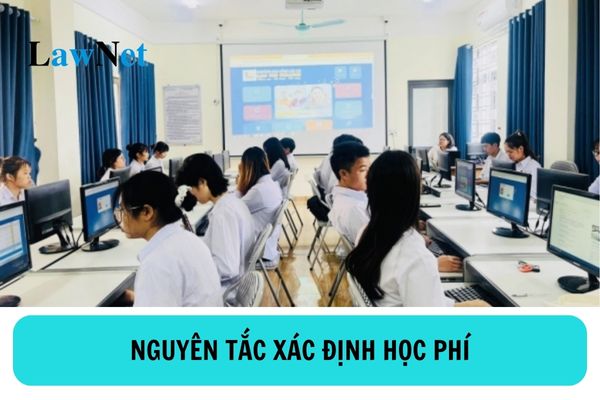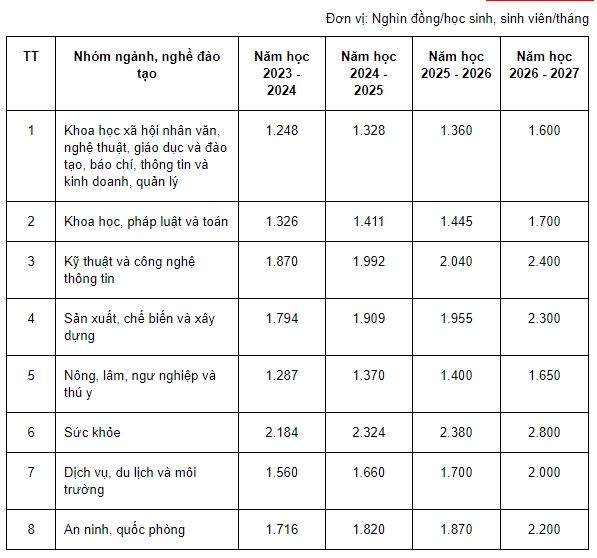Vietnam: What are the principles of determining tuition for public vocational education institutions?
What are the principles of determining tuition for public vocational education institutions?
According to the provisions of Clause 2, Article 8 of Decree 81/2021/ND-CP of Vietnam's Government, principles of determining tuition for public vocational education institutions are as follows:
- Public vocational education institutions that have guaranteed recurrent expenditure partially and public vocational education institutions that have recurrent expenditure guaranteed by the government (hereinafter referred to as “public vocational education institutions that have not guaranteed recurrent expenditure entirely”) shall determine tuition without exceeding the top limit under Point a Clause 1 and Point a Clause 2 Article 10 hereof;
- Public vocational education institutions that have guaranteed recurrent expenditure entirely shall determine tuition for each major based on variables compared to the top limit applicable to vocational education institutions that have not guaranteed recurrent expenditure entirely according to Clause 2 Article 10 hereof;
- Public vocational education institutions that have guaranteed recurrent expenditure and investment expenditure entirely and are allowed to determine tuition must make sure to cover costs and accumulate according to Law on Vocational Education and other relevant documents.

Principles for determining tuition fees for public vocational education institutions (Image sourced from the Internet)
What is the tuition fee ceiling for vocational education in the 2024-2025 academic year?
According to the provisions in Clause 2, Article 10 of Decree 81/2021/ND-CP, amended by Point b, Clause 3, Article 1 of Decree 97/2023/ND-CP, the tuition fee ceiling for vocational education in the 2024-2025 academic year is as follows:
- For public vocational education institutions not yet self-financing recurrent expenditures:

- For public vocational education institutions self-financing recurrent expenditures, the maximum tuition fee shall not exceed twice the fee ceiling stipulated for public vocational education institutions not yet self-financing recurrent expenditures;
- For public vocational education institutions self-financing both recurrent expenditures and investment, they are allowed to independently determine and decide the tuition fees according to the provisions of the 2014 Vocational Education Law and other relevant documents;
- For high-quality training programs (including programs transferred from abroad for vocational education), vocational education institutions are allowed to independently decide the tuition fees based on the technical-economic norm to ensure cost recovery with an accumulation and publicly disclose this before enrollment;
- For training programs that meet accreditation standards at public vocational education institutions self-financing recurrent expenditures, institutions partially financing recurrent expenditures, and institutions with recurrent expenditures assured by the state, the maximum tuition fee shall not exceed 2.5 times the fee ceiling of public vocational education institutions not yet self-financing recurrent expenditures.
Which majors in vocational education institutions receive a 70% tuition fee reduction?
According to Clause 1, Article 16 of Decree 81/2021/ND-CP regarding subjects eligible for a 70% tuition fee reduction:
Eligibility for tuition reduction and tuition financing
1. Eligibility for a tuition reduction of 70% includes:
a) Students pursuing traditional arts and specific majors in public, private vocational education institutions and higher education institutions providing cultural - artistic training;
b) Students pursuing traditional art forms or taxing, toxic, or hazardous occupations in case of vocational education as per lists of taxing, toxic, or hazardous occupations regulated by Ministry of Labor – War Invalids and Social Affairs;
c) Kindergarten children and students who are ethnic minorities (other than very minor ethnic minorities) in hamlets with particular difficulties, communes in category III areas, ethnic regions and mountainous regions, communes with difficulties in coastal regions and islands according to regulations of competent authority.
...
Hence, students studying traditional and distinctive arts in vocational education institutions will receive a 70% tuition fee reduction in the following fields:
- Traditional musical instrument performer;
- Traditional Hue musical instrument performer;
- Southern Vietnamese folk music;
- Theater actor;
- Folk performance arts;
- Ca Tru performance arts;
- Bai Choi performance arts;
- Traditional musical instrument performances.

